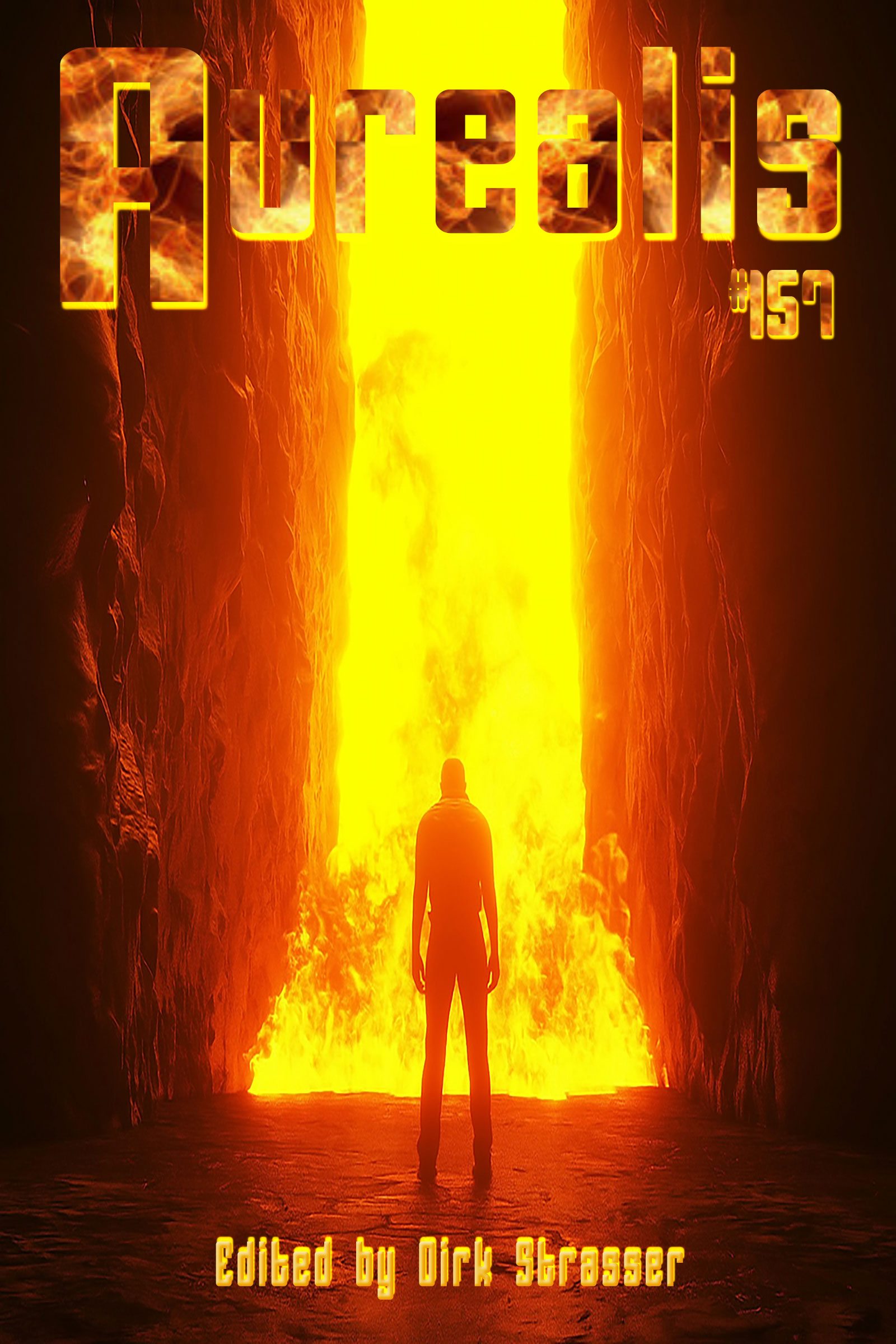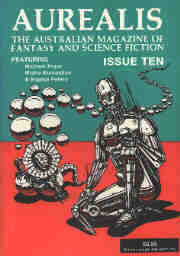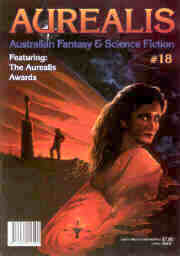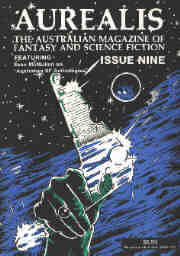Aurealis #157
$3.99
Join us for Madeline Byrne’s ‘Song of the Spear’, a tightly braided historical fantasy inspired by Norse and Celtic mythologies. Stay for ‘The Momentum of a Library Card Between Spaces’ where Anthony Sweet explores the human cost of faster-than-light technology. And don’t miss ‘Autonomous’, Lyle Hopwood’s cautionary tale about the fallibility of AI and the value of human intervention.
- From the Cloud — Dirk Strasser
- The Song of the Spear — Madeline Byrne
- The Momentum of a Library Card Between Spaces — Anthony Sweet
- Autonomous — Lyle Hopwood
- Thoughts on Interstellar Trade and Transport — Daniel Thompson
- The Craft of Writing: Chasing Whispers — Phil Nicholls
We are living in the golden age of fantasy prequels. At least on screen. I’m usually a little wary of prequels. To me, they suffer one big handicap compared to non-prequels: we know the ending. Take away the tension of an uncertain ending and the narrative drive can falter. There are ways around this problem but, in my view, prequels are behind the eight ball from the start.
The prominence of The Rings of Power (2022–) and House of the Dragon (2022–) has created a lot of discussion on what makes a good prequel. Film critic Steven D Greydanus refers to Shrinking World Syndrome, saying, ‘As a franchise plays out, very often, the more the mythology expands, the smaller the universe gets. Previously unconnected characters and events that gave the fictional universe a certain expansiveness are increasingly tied together for dramatic effect, until the whole story is about a small group of closely connected individuals.’
There’s no doubt that great prequels expand the universe rather than repeat it. Given this criteria, Molly Templeton in her Tor.com article argues that The Rings of Power is coming up a little short so far. She says, ‘With three thousand years of history to explore, we’re getting the same familiar faces again—Galadriel, Elrond, Gandalf, Sauron. Is the world really so small that these are the only ones with stories worth telling? The best parts of the show, for me, are Nori and Adar and Bronwyn and Arondir—they’re the ones who make the world feel larger and richer and give the illusion that things are happening even in the places where there isn’t a camera to see it.’ In defence of the writers, however, you could argue that the longevity of the main players in the Tolkien universe inevitably requires that they be prominent in The Rings of Power prequel.
According to some, the House of the Dragon has a different problem. With its concoction of murder, revenge, infighting, incest and dragons, does it appear to be a little too familiar to be considered a truly great prequel? Sure, we’re getting more dragons and more Targaryens, but is simply more what good prequels are about? Is it repeating rather than expanding the universe? Still, the revenge cycle worked brilliantly in Game of Thrones (2011-2019), so why not keep it cycling? In the end, the overriding hope for fans is that House of the Dragon provides redemption after the much-maligned ending of Game of Thrones. Give us more of the same, but with a better ending.
What about prequels in fantasy books? The first prequel I read was C S Lewis’ Narnia book The Magician’s Nephew (1955). I remember trying to get my head around the bewildering fact that the book about the origin of Narnia—which included an explanation of how a London lamppost came to appear in a Narnian forest in The Lion, the Witch and the Wardrobe (1950)—could be the sixth book in a seven-book series. Publishers have since released the series in chronological order so that newer generations will read The Magician’s Nephew first. The interesting thing is that The Magician’s Nephew prequel works either way because it is self-contained. Perhaps another criterion for a great prequel is that it can be read independently.
A more recent prequel I’ve read is Philip Pullman’s La Belle Sauvage (2017), the first book in The Book of Dust trilogy. Philip coins the term ‘equel’ for this novel, describing it a companion work to his His Dark Material trilogy that can be read on its own. Whatever the case, it seems to also meet the other criteria for great prequels by expanding our understanding of the divinatory alethiometer and the enigmatic particle Dust. Pullman manages to maintain high levels of tension, despite the fact that we know the baby Lyra will survive, by focusing the story on a new character Malcolm who is trying to save her.
One thing isn’t in doubt: when a prequel is done really well, it can be immensely satisfying.
All the best from the cloud!
Dirk Strasser
From The Song of the Spear by Madeline Byrne:
Caithness. Twelve women ride steady across the marsh, the hooves of their dark horses bearing mud from as far west as Morac. A man, Daurrud, watches them arrive, but it is his smallest and most steadfast daughter, Inga, who he orders to follow them.
From The Momentum of a Library Card Between Spaces by Anthony Sweet:
“Dad? I have a question.”
“Yeah mate?”
Edmund watched his son put down his fork with the full earnestness of a third grader. The boy kept his favourite tennis ball in his other hand and punctuated every third word with a bounce on the table. “If you don’t come back this time, can I have your laptop?”
From Autonomous by Lyle Hopwood:
It wasn’t immediately apparent why the autonomous vehicle notified Surya that it wanted to hand over control to a human.
From Thoughts on Interstellar Trade and Transport by Daniel Thompson:
Space freighters are a concept as old as science fiction itself, but will we ever see them in reality? What substance or item could possibly be valuable enough to load it up in a spaceship, accelerate it to a decent fraction the speed of light, coast through trillions of miles of vacuum, decelerate, and then offload it at a target destination?
From The Craft of Writing: Chasing Whispers by Phil Nicholls:
In conversation with Eugen Bacon on writing short stories, collaborating, editing and her publication journey.




